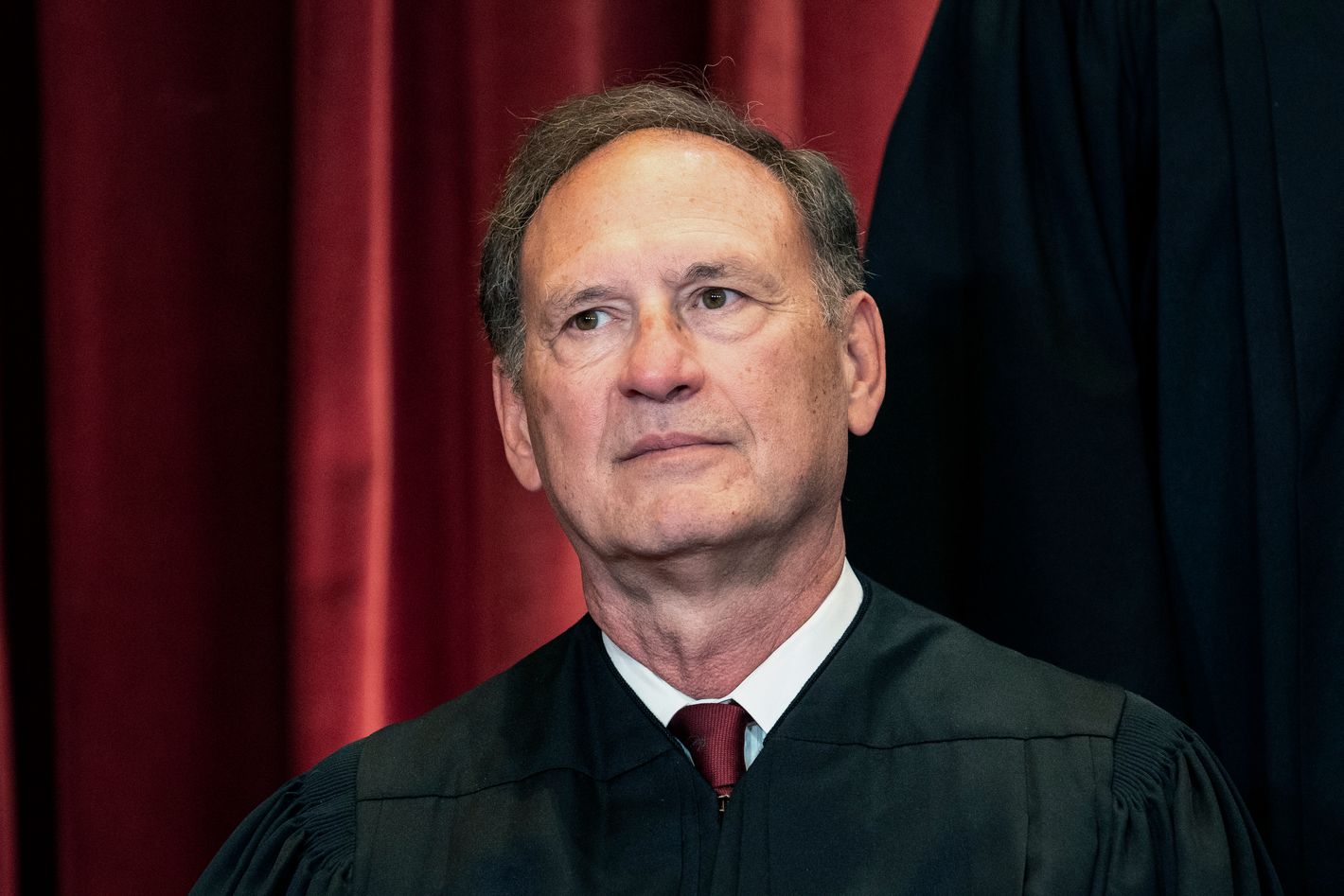The Supreme Court’s Problems Are Bigger Than Alito
Partisans with lifetime appointments are dangerous.

By the time Samuel Alito or his wife, Martha-Ann, flew the American flag upside down at their home in January 2021, the Supreme Court had already lost some luster in the eyes of its beholders. Some had come to feel that the Court served partisan interests above the people and with good reason. Donald Trump had put the matter in his usual stark terms when, in 2016, he promised to put pro-life justices on the Court so they could overturn Roe. Alito, a conservative Catholic, was not one of those justices; his tenure began before Trump entered the White House. But as Trump made good on his word and appointed three conservative justices, he shifted the balance of the Court even further to the right. Roe was in their crosshairs, part of an ambitious project to remake the country along conservative lines. The Court could not be trusted.
Alito’s flag underlined the matter, at least to his troubled neighbors. When the New York Times broke the story last week, Alito blamed his wife and said she was reacting “to a neighbor’s use of objectionable and personally insulting language on yard signs.” An upside-down American flag is a well-known distress call, and it had been co-opted by election deniers well before the Alitos displayed it at their home. The Capitol riot had occurred a week earlier, and the Biden inauguration was days away. No one but the Alitos can say precisely why they decided to fly the symbol, but no one can deny the circumstances, either. The Alitos look like culture warriors, as ideological as any sitting Republican politician.
Then there’s the matter of Bud Light. Legal journalist Chris Geidner reported on Sunday that in August 2023, as a conservative boycott raged, Alito sold stock in Anheuser-Busch, then bought stock in Molson Coors. Again, only Alito can say why he did this, and he declined to explain himself to Geidner. Again, though, the circumstances are suspicious. Conservatives had thrown a collective tantrum because the brand sent a few cans to transgender actress and influencer Dylan Mulvaney. Geidner argues that “the fact that he also purchased Molson Coors stock in the same price range on the same date, in addition to all of the outside activity, makes it significantly more likely that it was a boycott-related action.”
To avoid the appearance of partisan loyalty, Alito should recuse himself from election cases or cases involving rights for transgender people. Yet there’s little pressure for him to do so. Jeremy Fogel, a former federal judge and the director of the Berkeley Judicial Institute, told the Times that Alito’s flag may have triggered a review if he served on another court. At the Supreme Court, though, “you don’t really have anywhere to take it,” he said.
That’s a problem, and it’s older than Alito’s time on the Court. The conservative majority to which he belongs could destroy the Court, in a sense; the institution will probably survive in some form, but it cannot sustain this reputational damage forever. Conservatives may relish whatever’s left of the Court after this process is over, but most Americans probably will not. Thus the decline that had begun by 2021 will continue, unless drastic action is taken. Though it’s tempting to blame Trump for taking a wrecking ball to our institutions, he only capitalized upon the weaknesses that have plagued them for so long. The Constitution’s protections are limited, and they are restricted further by the far-right Supreme Court. It has always been foolish to pretend that a body of nine unelected jurists, who hail overwhelmingly from elite backgrounds and enjoy lifetime appointments, would consistently safeguard the American people from harm.
Today’s Supreme Court operates within a well-established reactionary tradition. Yes, the Court once brought us Brown v. Board of Education and Roe v. Wade; it also brought us Dred Scott v. Sandford and Buck v. Bell and Korematsu v. United States. Alito is not the first justice to undermine the Court’s moral and legal authority. At the Times, columnist Jamelle Bouie has compared the Court as it exists today to the Court as it existed in 1860, several years after the Dred Scott decision, which insisted that enslaved people were not citizens. The ruling’s critics said the Court “was not trying to faithfully interpret the Constitution as much as it was acting on behalf of the so-called Slave Power, an alleged conspiracy of interests determined to take slavery national,” Bouie wrote. “The Supreme Court did not have the political legitimacy to issue a ruling as broad and potentially far-reaching as Dred Scott, and the result was to mobilize a large segment of the public against the court.”
The year is not 1860, as Bouie pointed out. But if today’s Court persists on its course, it could sacrifice legitimacy to partisan loyalty. That is something to fear. Culture warriors, like Alito and the conservative legal movement that produced him, aren’t going away, and neither is the danger they represent. We need robust institutions that can scaffold democracy from whatever threatens it. Even — or especially — when the threat comes from within.
